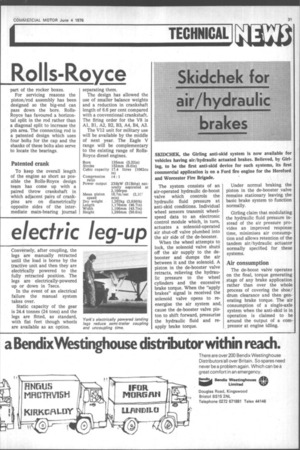Rolls-Royce part of the rocker boxes.
Page 33

If you've noticed an error in this article please click here to report it so we can fix it.
For servicing reasons the piston/rod assembly has been designed so the big-end can pass down the bore. RollsRoyce has favoured a horizontal split in the rod rather than a diagonal split to increase the pin area. The connecting rod is a patented design which uses four bolts for the cap and the shanks of these bolts also serve to locate the bearings.
Patented crank
To keep the overall length of the engine as short as possible the Rolls-Royce design team has come up with a paired throw crankshaft in which adjacent pairs of crankpins are on diametrically opposite sides of the intermediate main-bearing journal separating them.
The design has allowed the use of smaller balance weights and a reduction in crankshaft length of 6.6 per cent compared with a conventional crankshaft. The firing order for the V8 is Al, B1, A2, B2, B3, A4, B4, A3.
The V12 unit for military use will be available by the middle of next year. The Eagle V range will be complementary to the existing range of RollsRoyce diesel engines.
Bore Stroke Cubic capacity 135mm (5.32in) 152mm (6.0in) 17,4 litres (1062cu in) 14:1 Compression ratio Power output Mean piston speed Dry weight Length Width Height 235kW (315bhp) naturally aspirated at 2,10Orpm 10.7m/sec (2,1(' min) 1,202kg (2,6501b) 1,176mm (46.7in) 1,106mm (43.7in) 1,280mm (50.6in)




























































































































